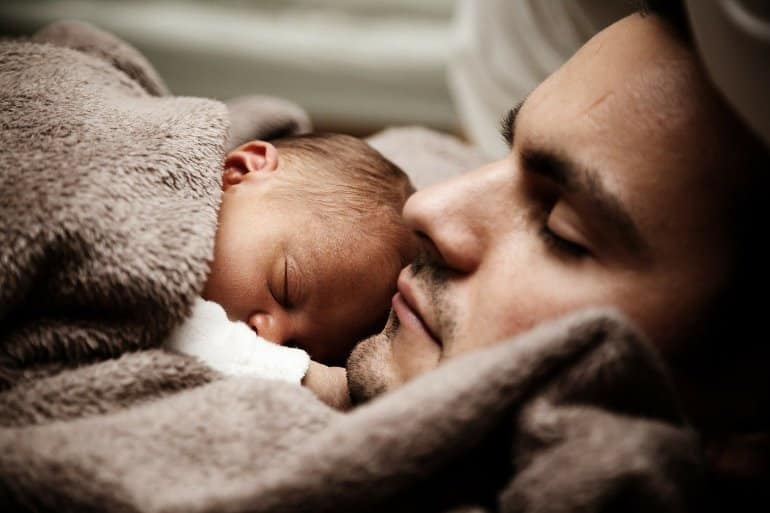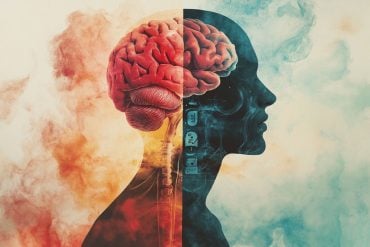Summary: Expectant fathers with higher levels of brain activation and oxytocin later endorsed a more “baby-led” empathetic style of parenting once their child was born.
Source: USC
When a baby cries, how do you figure out what they want? Without the ability to use words to communicate, we must rely on our “mentalizing” skills — our imaginative ability to intuit what someone else is feeling and what they need in response. When we mentalize, our brain lights up in regions associated with “theory of mind,” areas believed to be connected with the ability to understand and empathize with another.
This parental intuition is often associated with mothers, but preliminary work by researchers at the USC Dornsife College of Letters, Arts and Sciences has found that fathers also use mentalizing skills — and that neural activity while engaging in mentalizing may predict later parenting styles.
A study, recently published in the journal Developmental Psychobiology, found that when mentalizing, some expectant fathers had stronger activation in brain areas linked to theory of mind. They also had higher levels of oxytocin, often correlated with close relationships, in several mentalizing areas.
After the birth of their child, these same fathers reported a more “baby-led” parenting style involving physical closeness with the infant and responsiveness to infant cues, such as fussing or body language. A man’s prenatal brain could therefore potentially predict how he parents.
“Our study suggests that prenatal neural activation in theory of mind regions does seem to be related to a postpartum father’s self-reported endorsement of an intuitive parenting style,” says Sofia Cardenas, a psychology Ph.D. student at USC Dornsife. In intuitive parenting, the parent and child form a close bond which enables the parent to recognize what their child needs instinctively.
Cardenas is lead author of the study. She began the research as the focus of her master’s thesis, which she is now completing as part of her doctoral studies at USC Dornsife.
Activating fatherhood
The study looked at 39 first-time, expectant fathers who completed a task called the Why-How Localizer while in a magnetic resonance imaging (MRI) scanner. The task consists of a series of images of individuals completing various activities, such as helping someone zip up a dress or looking to the side.
Test-takers were asked to rate “how” or “why” a person engaged in a particular task.
Asking a person how anaction is being performed activates areas of the brain associated with bodily oriented mental processes. Asking someone why that action is being taken activates social behavior-oriented thought processing, or mentalizing. This enabled researchers to isolate and measure activation in areas of the brain when engaged in mentalizing.
During the Why-How task, the MRI machine acquired images of each subject’s blood flow. Participants also had blood drawn to measure oxytocin levels.
Following the birth of their child, fathers returned to the lab to complete a parenting philosophy questionnaire. Those who had shown strong activation in brain regions that support theory of mind reported a more empathetic form of parenting.
Also, fathers’ with greater theory of mind activation also tended to have higher prenatal oxytocin levels. This is the first study to examine expectant fathers’ prenatal oxytocin levels in tandem with brain activation.
While the sample size is small, Cardenas feels this highlights an opportunity for additional investigation.
“Although a handful of studies have looked at oxytocin levels in new mothers,” says Cardenas. “Fathers have mostly been ignored within this neurobiological research. We hope that will contribute to larger studies that investigate how fathers bond with a baby.”
Learning dad skills
The study reveals an opportunity for improving fatherly bonding, says Darby Saxbe, associate professor of psychology and the corresponding author of the study. Saxbe is also founding director of the USC Center for the Changing Family, headquartered at USC Dornsife.

“We often think of parenting as something that’s intuitive [to motherhood] — that moms are able to innately understand and connect with the infant in a way that fathers feel is more challenging,” says Saxbe.
“I think we can reframe it to think of this as a skill. There’s really promising research suggesting that empathy can actually be trained and taught.”
Informing dads that empathy and mentalizing skills can be enhanced with practice could help new fathers feel more empowered. She adds that this preliminary research emphasizes how much there still is to learn about fatherhood.
“Fathers are really understudied. The fact that our study is so preliminary speaks to the state of the [research],” says Saxbe. “We still don’t understand the basics of how men prepare to become parents or how men’s brains may map on to their parenting behavior.”
Both Saxbe and Cardenas are continuing research on the subject of fatherhood. Saxbe’s Neuroendocrinology of Social Ties (NEST) Lab, where Cardenas is completing her Ph.D., is currently studying how both parent’s hormones change during pregnancy and after the birth of a child.
About this parenting research news
Source: USC
Contact: Margaret Crable – USC
Image: The image is in the public domain
Original Research: Open access.
“Theory of mind processing in expectant fathers: Associations with prenatal oxytocin and parental attunement” by Darby Saxbe, et al. Developmental Psychobiology (via ResearchGate)
Abstract
Theory of mind processing in expectant fathers: Associations with prenatal oxytocin and parental attunement
Social cognition may facilitate fathers’ sensitive caregiving behavior. We administered the Why‐How Task, an fMRI task that elicits theory of mind processing, to expectant fathers (n = 39) who also visited the laboratory during their partner’s pregnancy and provided a plasma sample for oxytocin assay.
Three months postpartum, fathers reported their beliefs about parenting. When rating “Why” an action was being performed versus “How” the action was being performed (Why > How contrast), participants showed activation in regions theorized to support theory of mind, including the dorsomedial prefrontal cortex and superior temporal sulcus.
Fathers’ prenatal oxytocin levels predicted greater signal change during the Why > How contrast in the inferior parietal lobule. Both prenatal oxytocin and attunement parenting beliefs were associated with Why > How activation in the dorsolateral prefrontal cortex, a theory of mind region implicated in emotion regulation.
Posterior parahippocampal gyrus and dorsolateral prefrontal cortex activation during the Why > How contrast predicted fathers’ attunement parenting beliefs. In conclusion, fathers’ neural activation when engaging in a theory of mind task was associated with their prenatal oxytocin levels and their postpartum attunement parenting beliefs.
Results suggest biological and cognitive components of fathering may track with the theory of mind processing.







